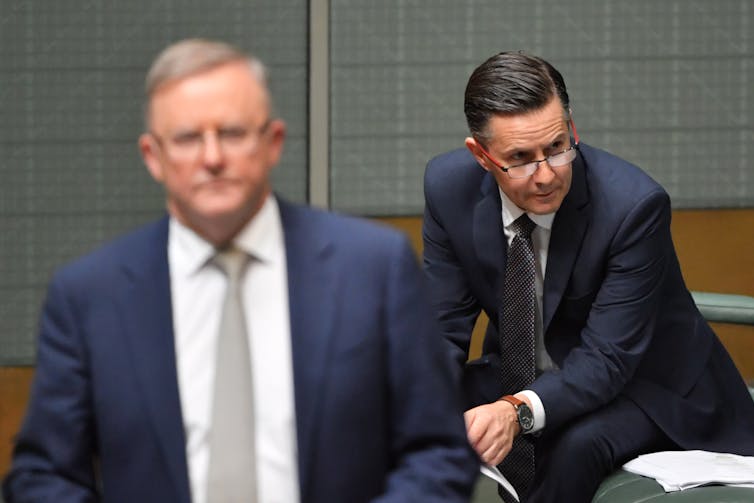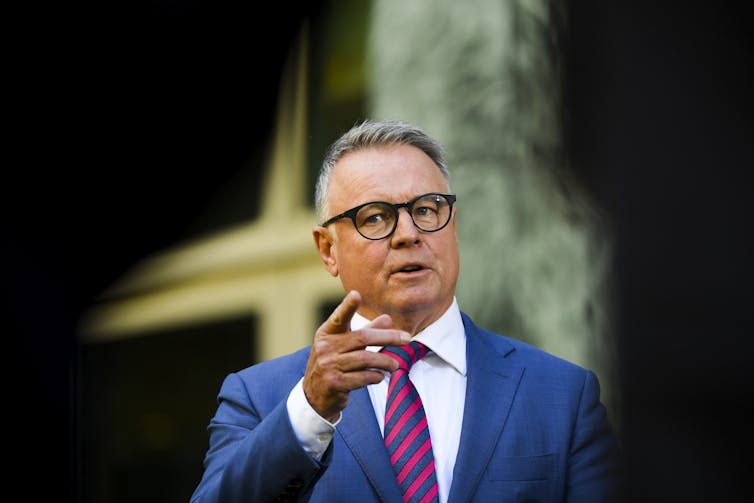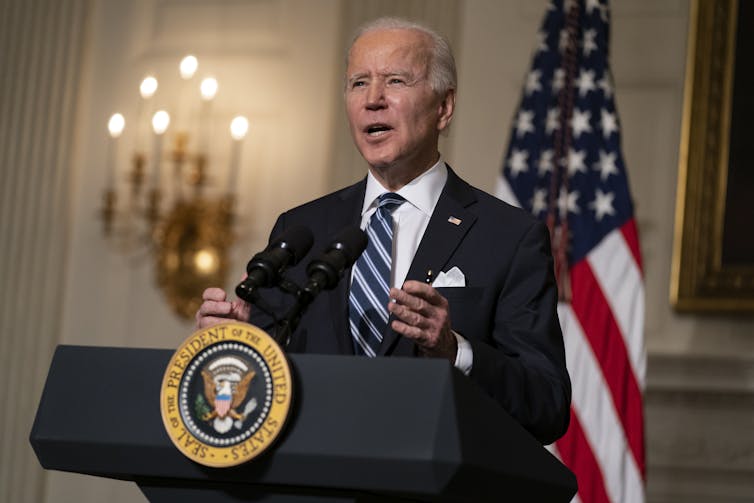Albanese throws a bone to Labor's Right, but Joel Fitzgibbon remains off the leash
- Written by Mark Kenny, Professor, Australian Studies Institute, Australian National University
Anthony Albanese’s sudden change of heart, swapping out Labor’s climate spokesman Mark Butler in favour of the more conservative Chris Bowen, can be read in two ways.
First, as a shrewd chess move: one that sharpens the economic arguments in favour of green jobs, boxes in Bowen’s Right faction behind existing climate ambition, and perhaps constrains Bowen as a potential leadership aspirant.
Alternatively, critics could view Albanese’s decision as more self-serving — the manoeuvring of an opposition leader desperate to shore up his defences.
The NSW Right’s outspoken convener Joel Fitzgibbon had made unusually public attacks on the Left-aligned Butler. Albanese will have a job of convincing people he has not blinked under pressure, throwing an ally under a bus.
That perception could, in turn, be dangerous. It may even trigger existential discussions on his leadership. Not merely because of the loyalty questions it invites, but because of the policy implications in an area of chronic political miscalculation.
 Mark Butler, right, is a factional ally of Albanese’s.
Lukas Coch/AAP
Mark Butler, right, is a factional ally of Albanese’s.
Lukas Coch/AAP
Judging by his behaviour, Fitzgibbon surrendered his frontbench spot last year to free his arms for the move against Butler, and by proxy, the campaign against Albanese’s leadership.
The Hunter-based MP is trenchantly pro-coal and anti-progressive. He’s made no secret of his antipathy for green-tinged inner-city politics, which he believes has alienated the party’s industrial origins.
Fitzgibbon blames Labor’s obsession with climate change for everything from the 2019 election failure – where it pledged a 45% emissions cut by 2030 – to the party’s dwindling purchase in the outer suburbs and regions.
Albanese’s position, like all opposition leaders, relies on a mixture of support: in his case, a foundation of Left MPs and the crucial backing of key NSW and some Victorian Right figures. Unsurprisingly, these supporters were the main beneficiaries of the reshuffle.
Deputy leader Richard Marles gets a super-portfolio combining national reconstruction, employment, skills, small business and science. Another Victorian Right figure, Clare O’Neill, gets a frontbench promotion as spokeswoman for senior Australians and aged care services – assisting the relocated Butler in health and ageing.
And Ed Husic, also an influential player in the NSW Right, is elevated to shadow cabinet in industry and innovation.
Taken separately, these moves may be justified. Together, however, they might also hint at Albanese’s vulnerability, given his own Left faction’s minority position.
 Joel Fitzgibbon is trenchantly pro-coal and anti-progressive.
Mick Tsikas/AAP
Joel Fitzgibbon is trenchantly pro-coal and anti-progressive.
Mick Tsikas/AAP
The bigger concern for progressives in the short-term will be what these personnel changes amount to in policy terms, if anything.
Does Albanese intend to scale back Labor’s climate ambitions? Fitzgibbon has explicitly called on his party to ditch interim targets entirely, and simply adopt the government’s goal of 26% emissions reduction by 2030.
During the 2019 election, then leader Bill Shorten struggled to quantify the negative impact on economic growth arising from Labor’s proposed 45% cut in emissions.
It was a strategic vulnerability on which Prime Minister Scott Morrison capitalised. He argued relentlessly that Labor’s formula would cost Australian jobs and send household and business electricity prices soaring.
Read more: Labor’s climate policy is too little, too late. We must run faster to win the race
Albanese’s decision to defer interim targets until closer to the next election had already invited doubts about whether Labor is truly committed to reaching net-zero emissions by 2050. Butler’s removal is likely to exacerbate those doubts.
The hold-fire approach leaves Labor’s left flank exposed to the Greens’ claims it is equivocating on climate action, just as the rest of the world finds new resolve.
As Albanese put the final touches on his reshuffle, the Climate Targets Panel of scientists and economists released a chastening report. It showed Australia would need to slash emissions by 50% by 2030, and achieve zero emissions by 2045 (rather than 2050) to be in line with the Paris commitment of keeping global warming inside 2℃.
Freshly installed US president Joe Biden has used a series of executive orders to accelerate US restructuring. He hopes to spur global momentum for climate action, calling on developed economies to rapidly increase their commitments.
 US President Joe Biden will call for developed economies to act on climate change.
Evan Vucci/AP
US President Joe Biden will call for developed economies to act on climate change.
Evan Vucci/AP
Albanese, however, denies any diminution. He maintains that Bowen, a former treasurer, is better placed to reframe climate policy in more starkly economic terms, stressing the opportunities for new green jobs against the risks cited by the Coalition.
This may well be sound. Bowen’s established economic standing could allow a “green jobs of the future” rebranding of Labor’s emissions approach.
That would be a breakthrough, given the widening divide between Labor’s professional and blue-collar constituencies, and claims by Fitzgibbon and others on the party’s Right that it has abandoned regional workers through its green emphasis.
There’s little doubt that, as an experienced minister, Bowen has the skills and the policy depth for the job.
But there’s a judgement question. His role in the 2019 election loss – chief advocate of an unwieldy suite of adventurous tax proposals – was arguably more central to Labor’s shock defeat than any perceived overreach on climate.
Not finished yet, Fitzgibbon has described Butler’s removal as a good start but called for further policy change.
Fitzgibbon’s Right-aligned parliamentary colleagues seemed willing to accept his public undermining of Butler. It will be interesting to see whether they allow the same treatment of Bowen.
Read more: Biden’s Senate majority doesn't just super-charge US climate action, it blazes a trail for Australia
Authors: Mark Kenny, Professor, Australian Studies Institute, Australian National University





